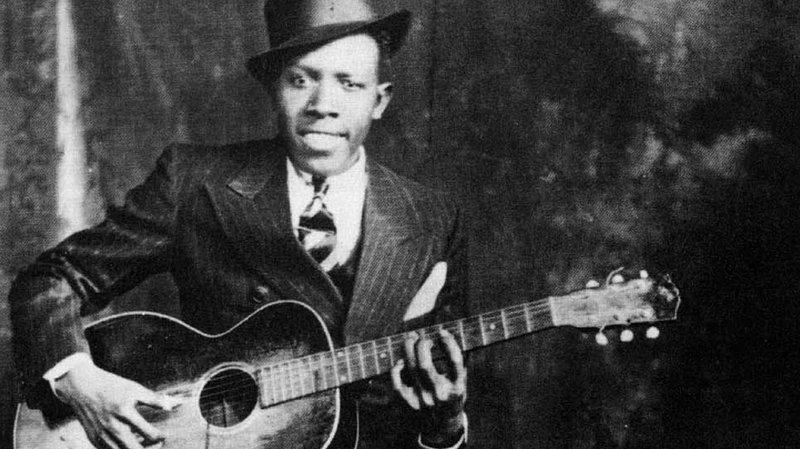 Robert Leroy Johnson was born on May 8, 1911 in Hazelhurst, Mississippi. He was the eleventh child to his mother, Julia. His father’s name was Noah Johnson. Noah was a plantation worker. When Robert was around 4 years of age, he was sent to live with his father in Memphis. It was there that Robert took an interest in the guitar. One of his brothers taught him the basics of the instrument. When Robert was around 9 years old, he went back to Mississippi Delta to live with his mother and his new stepfather, Dusty Willis. The Mississippi Delta region is close to the Yazoo River and is called the most southern place on earth. Willis worked hard in the fields. Willis and Robert were not on the best of terms, because Johnson did not want to work in the fields. All he wanted to do was play the guitar.
Robert Leroy Johnson was born on May 8, 1911 in Hazelhurst, Mississippi. He was the eleventh child to his mother, Julia. His father’s name was Noah Johnson. Noah was a plantation worker. When Robert was around 4 years of age, he was sent to live with his father in Memphis. It was there that Robert took an interest in the guitar. One of his brothers taught him the basics of the instrument. When Robert was around 9 years old, he went back to Mississippi Delta to live with his mother and his new stepfather, Dusty Willis. The Mississippi Delta region is close to the Yazoo River and is called the most southern place on earth. Willis worked hard in the fields. Willis and Robert were not on the best of terms, because Johnson did not want to work in the fields. All he wanted to do was play the guitar.
Robert married at age 19 to a 16-year-old young lady named Virginia Travis. They were married on February 17, 1929 in Penton, Mississippi. Unfortunately, Johnson’s wife died giving birth in April of 1930. Shortly after that devastating chapter in his life, he met an extremely talented musician called Son House. Robert learned to play the guitar from House, and his friend Willie Brown. Johnson managed to play the harmonica at a decent level, but he was a terrible guitar player. He would pick up the guitar in-between House’s and Brown’s sets to practice. The audience hated Johnson’s guitar playing.
He remarried in May of 1931 to Collet Craft in Hazelhurst, Mississippi. Johnson continued to travel the Delta region practicing and playing his guitar. He would play on street corners and in Juke joints. Robert’s second wife died when he was in his mid-twenties. It seemed like poor young Robert just could not catch a break.
In 1932, Robert Johnson played for Son House and Willie Brown. They were completely blown away. They said that he sounded so amazing. He had surpassed them. Everyone wondered how Johnson could have improved so much in such a short period of time. Robert’s fingers were unusually long, much longer than the average man. This would give him an advantage, but how could he go from a novice player to an expert in one year?
Legend has it, that Robert Leroy Johnson went to the crossroads near Dockery Plantation at midnight. It was said that he was met there by a large black man (The Devil) and asked him to tune his guitar. The man tuned his guitar and played a few songs. He then gave the guitar back to Johnson. In exchange for the master skills of a Delta Blues Musician, he surrendered his soul.
Now a skilled musician, Johnson would perform his songs, and songs of other musicians. He was still working the Delta region and would pay whatever people requested. This is how Johnson made a living. Robert Johnson was a local musician. He had little success on a commercial scale. Fortunately, from 1936 to 1937, he participated in two recording sessions. He recorded in San Antonio in 1936, and in Dallas in 1937. Robert recorded a total of 29 songs. Robert was paid for his recordings, and afterward he returned to Mississippi.
Robert loved to drink alcohol and play Delta Blues at parties, in juke joints, and in the streets. He blazed his musical trail everywhere he went. In 1938 Johnson was sought out by a journalist named John Hammond. Hammond wanted Johnson to perform in a concert at Carnegie Hall, only to discover that Robert Johnson had died. It was said that he was out at a night club. He ordered a bottle of liquor, and it was served to him with a broken seal. You were not, and still should not accept any bottle that has been opened out of your sight. He drank the bottle anyway and later died from poison. Robert Leroy Johnson pasted away August 16, 1938. He was only 27 years young.
Since Robert’s demise, his music has lived on. Although his life and music career were both very short, Johnson’s music has influenced Rock and Roll, Blues music, and many musicians from then to now. Brunswick Records owned Johnson’s original recordings. Columbia Records bought the originals and released a collection of Robert’s recordings in 1961 titled “King of the Delta Blues Singers”. Because of this release, Johnson’s music was finally exposed to the massive audience it deserved. Hall of Fame inductions, awards, scholarships, foundations, and documentary films have all been released in the name of Robert Leroy Johnson since the 1960’s. Johnson was ranked fifth out of the top 100 Greatest of All Times by David Fricke of Rolling Stone Magazine.
The marker above shows if for the gravesite and marker on the Mississippi Blues Trail for Robert Johnson.
(Contributed by Derriere Hendricks a student from the MUSIC INDUSTRY ESSENTIALS program)
